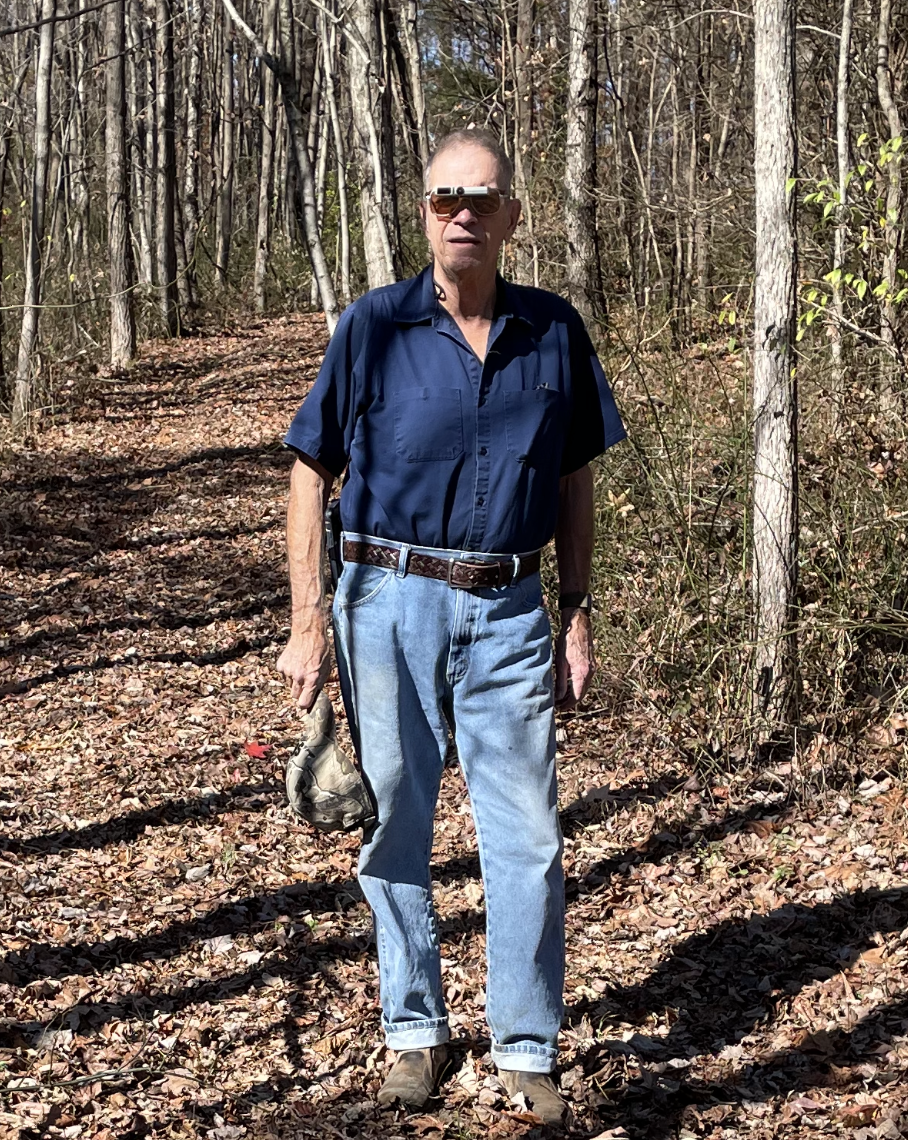
Obstacles come into our lives for one of two reasons: to be overcome or to divert you onto a new path. Gary Deburger is the kind of person who faces obstacles with bravery, strength, and the can-do spirit. In 1973 he joined the United States Air Force, working hard to provide exceptional service to his country. His dedicated work ethic was matched when he met his wife, Connie, who to this day has been by his side both during his military service and after.
The two enjoy spending time with their two children and three grandsons, living in the beautiful town of Osgood, Indiana. Connie and Gary live on 26 acres that they have turned into a wildlife habitat including a creek, horses and endless opportunities for bird watching—their dream retirement lifestyle. But reduced sight got in Gary’s way giving him a new challenge to overcome.
Gary’s first vision obstacle came from an eye injury in 1985 when he damaged his cornea and required surgery for a cataract. In 1992 the retina in his right eye detached and in 1994 he had a corneal transplant after a tree limb hit him in the eye. Yes, he agrees, “I should have ducked!” Since then the vision in that eye has been 20/800— the only letter he could see was twice as big as the top letter on the eyechart- barely enough to offer any helpful vision.
The second challenge came in 2020 when he was diagnosed with Retinoschisis by his VA hospital, which a month later resulted in a detached retina in his left eye, the one he depended on. That was the end of driving and it was pretty devastating for both Gary and Connie. Retinoschisis is a condition in which the retina (the light-sensitive lining in the back of the eye that transmits the visual signals) separates into two layers. Vision loss from this retinal “splitting” can occur either slowly or quickly. Seven months after this new diagnosis the retina detached again requiring even more surgery. After this surgery, and with a special silicone oil placed into that eye, Gary saw only 20/400 which left him legally blind. Ten months later, after removal of the oil his vision improved to 20/100 without eyeglasses and to 20/70 with them.
“I didn’t want to give up,” Gary said. “I wanted to be able to do the things I had always done before— like drive my tractor and take care of the land— see my grandkids and my lovely Connie.” Overcoming these obstacles was Gary’s next mission.
The couple did everything they could to learn what the vision care world offered patients with low vision. At the VA hospital Gary visits, he was told to try strong magnifying glasses but they were of little help. Online, during one of their many nights researching, Connie and Gary discovered bioptic telescopes— specially designed glasses for visually impaired people—which could be helpful for many of the things Gary wanted to do, potentially even allowing him to drive again— and so they immediately inquired about bioptic glasses with Gary’s optometrist at the VA hospital. The vision coordinator at the VA recommended the Deburgers make an appointment with Dr. Matt Johnson, an optometrist who specializes in low vision care, at the Battle Creek VA Medical Center in Michigan.
After driving five hours to see Dr. Johnson, Gary was evaluated for Ocutech bioptics. Dr. Johnson demonstrated how the bioptics work and determined the best power and design for Gary’s level of vision and for what he wanted to be able to see and do. He was ultimately prescribed the Ocutech VES Sport-II, the newest version of the company’s Keplerian bioptic telescope. It’s optical design provides the widest field of view possible and it can be focused to as close as 9 inches. Gary found it easy to use and comfortable to wear and he could use it to see at virtually any distance he wanted to see better.
“I am so grateful for my new Ocutech glasses. I’ve struggled with low vision for the past two years, which prevented me from doing my hobbies,” Gary explained. “I am excited to use my new bioptic to see more clearly in the distance and see the things that bring me joy, like watching the wildlife in my yard and taking care of my family.”
Connie and Gary are filled with joy that Gary can again do what he loves and enjoy nature the way he always had— and the future continues to hold even more possibilities for him. Gary will soon start working with Indiana University’s Bioptics Driver Training program as he expects that one day soon he will obtain his special bioptic driver’s license, so he can once again be behind the wheel.
“I am now finally able to read, recognize people’s faces, tell colors apart and even see much more on the TV thanks to my Ocutech bioptic,” Gary said, smiling. “It truly has been life-changing.”
About Ocutech
Ocutech is the worldwide leader in developing advanced high-quality telescopic low vision aids. Ocutech bioptics are available in a range of designs and powers, so that the low vision specialist can prescribe the version most appropriate for the individual’s level of vision as well as being able to address their specific vision goals. For more information about Ocutech bioptics for low vision visit www.ocutech.com. Complete the Ocutech bioptic self-assessment form to determine if you or a loved one might be a promising candidate for Ocutech bioptic low vision aids.
[av_button label='Back to Testimonials' icon_select='yes' icon='ue878' font='entypo-fontello' link='manually,/bioptic-success-stories/' link_target='' size='small' position='left' label_display='' title_attr='' color_options='' color='theme-color' custom_bg='#444444' custom_font='#ffffff' btn_color_bg='theme-color' btn_custom_bg='#444444' btn_color_bg_hover='theme-color-highlight' btn_custom_bg_hover='#444444' btn_color_font='theme-color' btn_custom_font='#ffffff' id='' custom_class='' av_uid='av-wu035y' admin_preview_bg='']